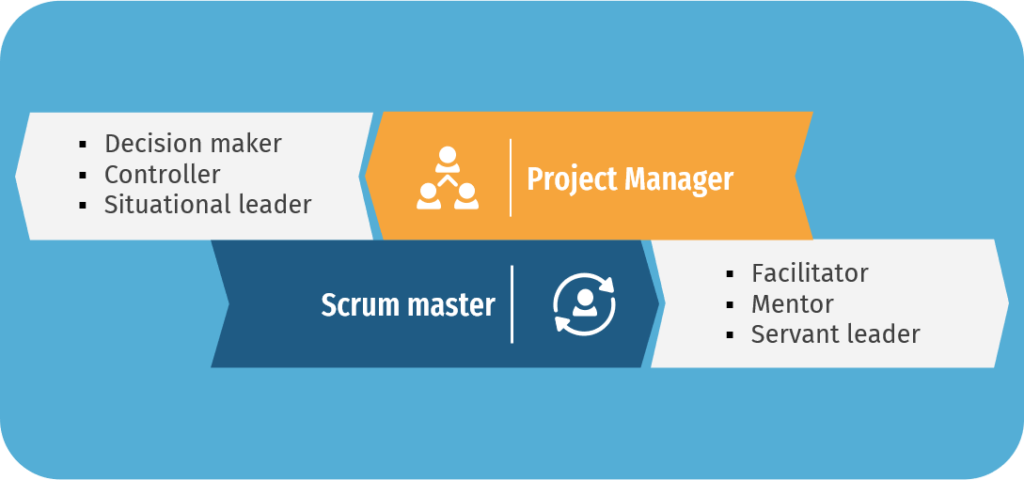With the increasing number of project management frameworks and certifications, terminologies often overlap causing confusion. In this article, we’re tackling the similarities and distinctions of two of the most mixed-up terms: Project Manager (PM) and Scrum Master (SM).
The traditional role of the Project Manager
The PMBOK® Guide defines a project manager as “the person designated by the implementing organization to lead the team responsible for achieving project objectives.” Project managers are at the center of the project, monitoring the status of the team and acting for the organization’s ultimate benefit. They define the project process, make decisions regarding scope, budget, and sometimes even specifications – so they cannot be facilitators, because their position entails being biased.
The emergence of Agile and Scrum
Many projects fail due to the traditional rigid management processes they opt for, hence the advent and the increasing adoption of the Agile methods in order to acclimate to the market’s changing demands.
Agile has witnessed a rapidly increasing popularity with a broad range of derived frameworks that have been created and implemented in correspondence with the Agile values and principles. Scrum, for instance, is one of the most commonly used agile methodologies. And naturally, with every arising concept, a new set of terminologies come along, such as the “Scrum Master” role in this case.
In Scrum Project Management, the project team consists of the product owner, Scrum Master, and cross-functional team members. A Cross-functional Team consists of members possessing all the required skills to produce a valuable product, such as designers, developers, testers, etc. The Product Owner is responsible for defining the product and maximizing its value to respond to clients’ expectations and market requirements. They collaborate with stakeholders, customers, and teams to set the product vision. The Scrum Master, also called Servant Leader, Project Leader, Scrum Leader, or Team Coach, focuses on facilitating their team work and tackling any potential impediments.
The role of a Project Manager here is replaced by the Scrum Master. But, it is not just a matter of changing terms, it is also a matter of shifting roles. Unlike the Project Manager, the Scrum Master is not the center or main leader of the project, they’re more of a servant of the team. Having a primary responsibility of removing impediments, scrutinizing and streamlining processes to boost the team and organization’s resilience and effectiveness, is what distinguishes a Scrum Master’s role under Agile.
As servant leaders, Scrum Masters also address other time-consuming processes, causing bottlenecks or impeding the agility of the team or organization. Processes or departments that may need to be tackled by Scrum Masters include but are not limited to finance, change control committees, and audits.

Can a Project Manager become a Scrum Master?
Yes! However, in order to embrace any role, you should adapt to its requirements. The responsibilities entailed by the Scrum master’s role include being able to remove any hindrance factors or aspects, creating an environment that promotes the team’s effectiveness, addressing team dynamics, building a robust relationship between the team and the product owner as well as other parties outside the team, and protecting the team from external disruptions and distractions. So, if you have what it takes to fulfill these responsibilities, you can surely be a Scrum master.
The transition shouldn’t be difficult since a traditional project manager is supposed to be a proficient communicator, a good leader, and an expert in managing resources and conflicts. This represents the required skill set for a successful Project manager within both predictive and Adaptive or Agile life cycles.
Now, when it comes to titles, you have the freedom within your resume or Linkedin profile to call yourself a Project Manager, Scrum Master, Team Leader, or whatever your personal preference is. However, each organization has its own guidelines and rules when it comes to assigning these titles.
Is a PMP certification the right choice for Scrum Masters as it is for Project managers?
The most obvious certification choices for professionals aspiring to get into a Scrum Master position include the Certified Scrum Master (CSM), the Professional Scrum Master (PSM), the Agile Certified Practitioner (PMI-ACP), and the Scaled Agile Framework (SAFe) certifications.
But, what about The Project Management Professional (PMP)? Would it be considered an asset for those aiming to become or convert to the role of a Scrum Master?
In the Agile Practice Guide, which is one of the main references for the PMP certification, the Project Manager and the Scrum master are considered the same: “In agile, three common roles are used: cross-functional team members, product owner, and team facilitator. The team facilitator is also called project manager, scrum master, project team lead, or team coach.” (Agile Practice Guide, pages 40-41). So, if a PMP certification qualifies its holder to play the role of a project manager, so does it for professionals aspiring to be Scrum Masters. A project manager should just be able to adapt to work in an adaptive environment where servant leadership is crucial, and under a predictive framework where they’ll have to opt for different leadership styles according to the situation.
The PMP certification exam was updated to be 50% predictive and 50% adaptive or Agile which means that the credential is now inclusive. Whatever industry or field you’re aiming to work in and whatever title you’re aspiring to hold, understanding what both roles entail and how the Scrum framework operates is a great advantage.
Check the Scrum Cheat Sheets to learn about Scrum roles, artifacts, ceremonies, and much more!
PMP sample question
Andrew works as a project manager for a company that used to employ the predictive method. After attending a conference about Agile project management, his company’s decision-makers decided to start implementing this approach starting next year. Andrew was concerned that he would lose his job since, as far as he knew, an Agile team consists solely of team members, a scrum master, and a product owner, therefore his company would no longer require a project manager. Is Andrew right to be concerned?
A. Yes, he can’t be part of the agile team since it does not consist of a project manager
B. Yes, he should either switch to the role of a scrum master or seek new opportunities within other companies that use the predictive approach
C. No, he can work as a product owner, as the roles of a project manager and a product owner are quite similar
D. No, he can keep working as a project manager, but he will be acting more as a facilitator
The correct answer is D. Andrew, as a project manager in an agile environment, should now operate as a facilitator or a servant leader.
